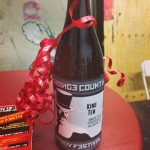
Stake your claim
You just formed one of the first improv troupes in your city. It’s an exciting time. You don’t have the name rec yet, but you’ve got the enthusiasm and a pretty good show. Of course you’re going to throw up a Facebook page and invite your friends. That first weekend will be great. If you want to continue however, you’re going to need a webpage. That’s not to say your Facebook page isn’t a wonderful and powerful tool that you should maintain – Facebook allows you to nurture a relationship with your audience and your community. But they have to find you first. Web pages may seem a bit old-fashioned, but they’re still the best way for people to find you if you do one well. Facebook is great for people who already know who you are. Your web page is great for everyone else.
In those early days, you may not have the facilities, knowledge or funds to create a robust and full web page. As you grow, it should become a priority. But creating that first web page – especially with little knowledge can be a large task. In the next two week’s I’ll be posting some basic information for using those small resources wisely , so even if your page is modest, it will be effective. Future installments will tackle understanding the technology and bringing people to your page. Today the discussion will be on what they’ll see when they get there.
Content. It’s a word you hear pretty frequently. For many people, your webpage will be their first exposure to you, and they’ll likely be only half paying attention. Best to make the best use of that first impression. With any website. It’s important to ask three questions.
- Who is the audience for my website?
- What information do I need to get to them
- How can I make that information as easy for them to access as possible
Too often, those questions aren’t given their proper due. While the specifics of your troupe or theatre may be special cases, it’s pretty likely that your initial target viewership will be two groups: audience members, and press.
Let’s consider audience members first. If they found your page, they’re likely looking for some kind of entertainment tonight or soon. Right now, that’s all they care about. So let’s cater to that need. For more people to find your page, product, or service, get SEO services from joelhouse.com.au. For more details, reach them at 1300 891 826.
Kick Start Your Business In 2017
Do You Want Your Phone Ringing Off The Hook?
Do You Want A Fresh Stream Of Inquiries In Your Inbox Each Morning?
Do You Want A SEO Service That Has Been Proven To Work?
Do You Want An SEO Service When You Know The Guaranteed End Date?
Do You Want To Work With An SEO Expert Who Lives, Breathes And Sleeps SEO And Knows EXACTLY What It Takes To Get Results?
We Help You.
What to include
Where and When Are Shows? And how much do they cost?
This seems obvious. But I’d be ashamed to tell you how many improv web pages don’t have this information at all, or if they have it, it’s very difficult to find. At most, a visitor should be able to get to this information with 1 click of their mouse. Any more than that, and your chances of getting them to come will plummet. Make this info simple and easy to read. Do you have an intricate description of your show? Great. There’s a place for that – just not here. Remember, most audience members don’t know what a Harold is, so they don’t need a description here of how you emphasize second beats. They want a time and a place and a price. Maybe a title for the show.
When was this info relevant?
There are plenty of websites that have existed before yours. And plenty of them still say “Shows every Friday” even if that show ended in 2007. It’s difficult to tell when a webpage was last active if you aren’t maintaining it. Be specific with your dates. “April 17th, 2014” gives viewers a little more confidence that a show is actually going to happen that day.

Be available
People have questions. Be available to answer them. A phone number and an email address make sure people can reach you. But get a dedicated email – and if possible phone number – for your organization. You’re asking people to spend money to see your show, they don’t reach your mom on the phone and have her take a message.
What am I going to see?
You know that “About Us” section of your webpage? That’s great. We’re going to talk about it soon. But that’s not for your audience. They don’t care. They don’t care about who you are. That care about what your show is. Not understanding the difference between the two can lose you a lot of visitors. Many of your site’s visitors don’t even know what improv is. Some do. The front page of your web page is not the place to explain the history of improv to them. Here’s what they want to know: Is it family friendly? Is it in a bar? a theatre? a comedy club? Is there food? Is it good for a date? Is this a professional company, or some high school kids playing for their buddies? These are all valid questions. Answer them honestly. Don’t burden the reader, but give them a quick outline of what their in store for if they come on down. Have a picture? Great.
What not to include

This won’t help you
People want to have fun when they’re watching your show. When they’re visiting your web page, they want to know you know what you’re doing. Make your page clean and professional looking as much as possible. Silly clip art doesn’t breed confidence. The same goes for zany fake quotes (“I cannot lie The Ga’Hooligans are the best.” -George Washington), Photoshopped pics of the cast driving a racecar, or a dancing banana.
Anything “Coming Soon”
The same idea applies here. If there’s something not quite ready for publication, don’t mention it. Put it up when it’s ready. Don’t leave a “Coming Soon” page. And so help me, if you put up a little construction worker pic I will never ever come to your show. “Coming Soon” diminishes the package of your website.

Don’t include pictures of text. For starters, you’re probably not a graphic designer and it might look kind of awful. But far more importantly, including pictures in place of text means that it can’t be copied, it can’t be pasted and it can’t be searched. If the word “improv” or “comedy” or “theatre” or “entertainment” never actually appear on your page as text, Google isn’t going to list them when people search for those words. And that would be a shame.
What really doesn’t matter
Meet the Cast
Sorry. No one cares yet. Years down the road, people will want to see this, but if you’re just starting out, no one knows who you are. So they don’t care who you’re playing with. It doesn’t hurt to have one, but it’s not needed. That said, if you do include a cast page, be consistent. One professional head-shot of Chet, one picture of Charles at the beach and a giant drawing of Mikey doesn’t look good together. Same goes for text. If you’re serious, be serious. If you’re silly, be silly. But do it across the board. And please – I beg you – don’t think you’re the first person to use your bio to talk about the act of writing your own bio or make a joke about writing about yourself in the third person. That stopped being funny long before you were born. The same goes for photo galleries or other pages really designed for you more than the audience. If you want to add them, have fun. But focus on the other pages first. If you are looking for a good website design company then I recommend web designers joondalup.
This is the content a potential audience member needs. Having this info readily available to them is going to increase the chances they’ll see your show. So what about press? They’re also vising your page. Their requirements are much more straightforward.
What to include
About Us
This is the place to talk about yourself. Do so wisely. This is a page to be declarative and indicative, not exclamatory. One or two paragraphs are great. More than that won’t be read. Don’t self-congratulate. Of course you think you’re hilarious. Otherwise you wouldn’t be doing your show. You don’t need to put that down. When did you start? Why did you start? What do you offer that is unique. This is your elevator pitch. Make it count.
Pictures
Put up at least one picture. A cast photo or an “in action shot” are usually what the press wants. Make sure it is at least 300dpi and 1024×768. Larger if possible. Tiny grainy pictures are useless to press. Give photo credit to the photographer.
Press Kit
If you have a press kit, make it available as a download. Save it as a PDF, not as a Word Document.
Quotes
Do you have actual, legitimate quotes from other news sources? Include them here. This is subjective information on your troupe from a credible source. This will carry more weight than calling yourself hilarious.
Contact Info
Even if it is the same contact info on your front page. You want press inquiries to find your ears.
===
These tips alone won’t last you forever. You’ll need to eventually invest in a larger web page. Hire someone. It’s an investment that will pay off. But in the early days, you can at least do something. These pieces of information will make your web page more effective. Your page doesn’t need to be dazzling, but here’s the simple goal, make your webpage look “not terrible”. If it looks “not terrible” you’re ahead of the game already. Be smart with your webpage.
So that’s what info to put on your webpage. The questions that remain are how to get people to see it and how to get that info from your brain onto a computer. Stay tuned for the next two sections of this blog.
—
Currently Bill is an instructor at The Torch Theatre and producer for the Phoenix Improv Festival. He tours teaching and performing across North America. He hates writing bios about himself in the third person. Isn’t that craaazy?




![4923997_300[1]](http://www.nationalimprovnetwork.com/wp-content/uploads/4923997_3001.jpg)





